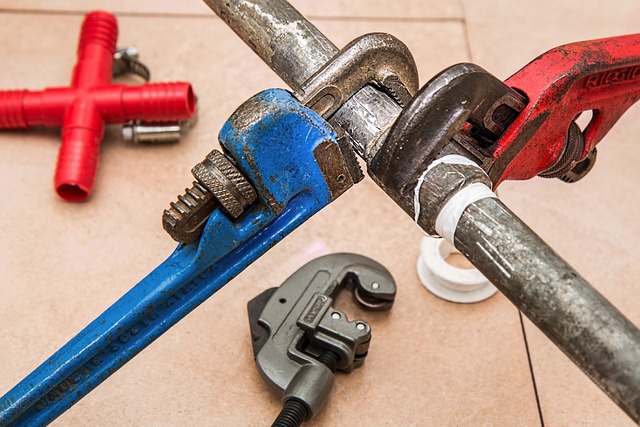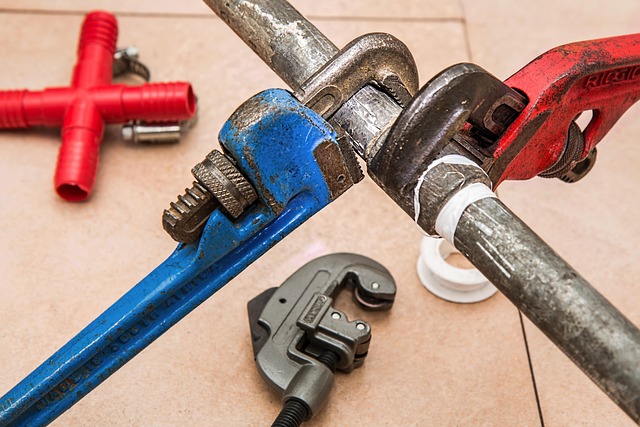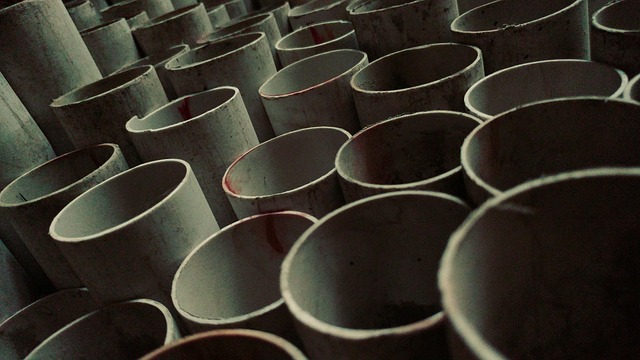Kitchen plumbing services play a pivotal role in renovations and new constructions, ensuring seamless installations. This includes assessing existing plumbing, selecting suitable sink types (stainless steel, ceramic, or composite), cutting holes for drainage, and rigorous testing. Measuring space, considering dimensions, and strategic planning are crucial steps for successful sink installation. Professionals offer guidance, preventing costly mistakes and enhancing kitchen harmony. Services range from basic repairs to complex drain installations, boosting performance and aesthetics. DIY installation requires structured approaches, while professional expertise is vital for intricate layouts and high-end fixtures. Proper maintenance, including regular cleaning and hot water flushing, extends sink lifespan. Homeowners often rely on these services for leak repair, clog removal, and addressing severe issues like tree roots in pipes, emphasizing their importance in maintaining functional kitchens.
“Transforming your kitchen begins with installing the centerpiece—a new sink. This comprehensive guide dives into the essentials of kitchen sink installation, offering expert insights on choosing the perfect fit for your space. From understanding basic requirements to selecting materials and planning measurements, we equip you with knowledge.
Discover common plumbing services tailored for kitchens and master the step-by-step process of installation. Learn tips for maintenance and troubleshooting, ensuring a smooth transition. Know when to call a professional plumber, leaving you prepared to enhance your culinary space.”
Understanding Kitchen Sink Installation: The Basics

Kitchen sink installation is a crucial aspect of any kitchen renovation or new construction project, and it’s not as simple as just fitting a new sink into an existing hole. Understanding the basics of kitchen plumbing services is essential for ensuring a smooth and functional installation process. The first step involves assessing your current plumbing setup to determine if modifications are required. Kitchen plumbing services experts will check water lines, drains, and any existing fixtures to plan the best route for installing the new sink.
This process includes deciding on the type of sink that suits your needs, be it stainless steel, ceramic, or composite, each with unique benefits and considerations. Once the sink is chosen, the professionals will carefully cut and fit the necessary holes in countertops or cabinets to accommodate the sink’s installation. They’ll also ensure proper drainage and water supply connections, testing the setup to guarantee a leak-free and fully functional kitchen sink.
Choosing the Right Kitchen Sink for Your Space

When it comes to kitchen sink installation, choosing the right fit is essential for both functionality and aesthetics. The first step in this process involves assessing your kitchen’s unique layout and identifying the space available. Kitchen plumbing services professionals suggest measuring the counter area, considering the size of existing drainage pipes, and evaluating the overall design of the room to determine the ideal sink dimensions.
Whether you’re opting for a traditional stainless steel sink, a sleek granite composite model, or a rustic cast iron one, ensuring it aligns with your space will enhance your cooking experience. A poorly fitted sink can create obstructions, make cleaning difficult, and even disrupt the overall balance of your kitchen. Therefore, taking the time to select the perfect sink for your space is a crucial step in any kitchen renovation or new installation project, facilitated by expert kitchen plumbing services.
Measuring and Planning for a Successful Installation

When planning a kitchen sink installation, accurate measuring and strategic planning are key to a successful outcome. It’s crucial to assess the existing space, taking into account the dimensions of the sink basin, faucet placement, and any potential obstructions like cabinets or pipes. Professional kitchen plumbing services often begin with a detailed survey to ensure a perfect fit, allowing for seamless integration without unforeseen challenges.
Proper planning involves not only measuring the physical space but also considering the type of sink, its material, and style that aligns with your kitchen design. Engaging with experienced plumbers who can guide you through this process ensures a smooth installation, preventing costly mistakes and ensuring your new sink enhances, rather than disrupts, the functional beauty of your kitchen.
Uncovering Common Kitchen Plumbing Services

When it comes to kitchen renovations or upgrades, one of the most common yet often overlooked aspects is kitchen plumbing services. These services encompass a wide range of activities designed to enhance the functionality and aesthetics of your kitchen’s sink area. From simple faucet replacements to more intricate drain installations, professional plumbers offer solutions tailored to meet various needs.
Common kitchen plumbing services include installing new sinks, replacing old or damaged pipes, and ensuring proper drainage systems. Plumbers also specialize in fitting modern fixtures like pull-down sprayers and garbage disposals, which not only improve convenience but also contribute to the overall look of your kitchen. Additionally, they can address issues with water pressure, leaks, and clogs, providing long-lasting solutions that ensure a seamless experience while preparing meals or doing the dishes.
Steps to Install a Kitchen Sink: A Comprehensive Guide

Installing a new kitchen sink is a project that many homeowners tackle to refresh their space. While it might seem daunting, following a structured approach can make the process smoother. Here’s a breakdown of the steps involved in a kitchen sink installation, guiding you through from preparation to final touches.
First, assess your existing plumbing setup and determine if any modifications are needed. This step is crucial for ensuring compatibility and avoiding future issues. Next, purchase the appropriate sink, considering factors like material, size, and style to match your kitchen aesthetics. With the right tools and a bit of patience, you’ll be ready to remove the old sink, install new pipes and fittings, and securely fasten the new sink in place. Proper sealing and connection are key to preventing leaks, so pay close attention to these details throughout the installation process.
Tips for Maintaining Your New Kitchen Sink

After installing your new kitchen sink, proper maintenance is key to ensuring its longevity and optimal performance. Regular cleaning is essential; use mild detergents and avoid harsh chemicals that could damage the sink’s finish. A quick scrub with a non-abrasive sponge or cloth will keep it looking fresh. Prevent mineral buildup by running hot water through the drain regularly, as this helps flush out any residue.
Consider using a sink mat to protect the basin from scratches and impact, especially if you have children or tend to drop heavy items. Additionally, kitchen plumbing services can offer valuable insights on maintenance routines tailored to your specific sink model, ensuring you get the most out of your investment.
Troubleshooting Common Kitchen Sink Issues

When it comes to kitchen sink installation or addressing common issues, many homeowners turn to kitchen plumbing services for expert assistance. Leaks are a frequent problem, often stemming from faulty connections or worn-out gaskets. A simple yet effective solution is to replace these parts, ensuring proper sealing and secure connections.
Another prevalent issue is clogs, which can be frustrating and unhygienic. Regular cleaning with natural remedies or plumbing snake tools can prevent blockages. However, for more severe cases, a professional kitchen plumbing service may be required to diagnose and fix the root cause, whether it’s tree roots infiltrating pipes or a broken drain mechanism.
When to Call a Professional Plumber for Kitchen Sink Installation

When tackling a kitchen sink installation project, many DIY enthusiasts may be tempted to take on the task themselves. However, there are instances where enlisting the help of a professional plumber is the safest and most efficient choice. Complex plumbing systems and specific fixture requirements often necessitate expert knowledge and tools that average homeowners might not possess.
Calling a professional plumber for kitchen sink installation is recommended when dealing with challenging layouts, unusual pipe configurations, or high-end fixtures. These scenarios may require specialized skills, such as expertise in under-sink plumbing, drainage systems, or the latest fixture installations. Professional plumbers offer peace of mind, ensuring the job is done correctly, safely, and in compliance with local building codes, thus avoiding potential leaks, damage to surrounding structures, or costly repairs down the line. Their services are invaluable when it comes to kitchen plumbing, ensuring a seamless and functional upgrade.
